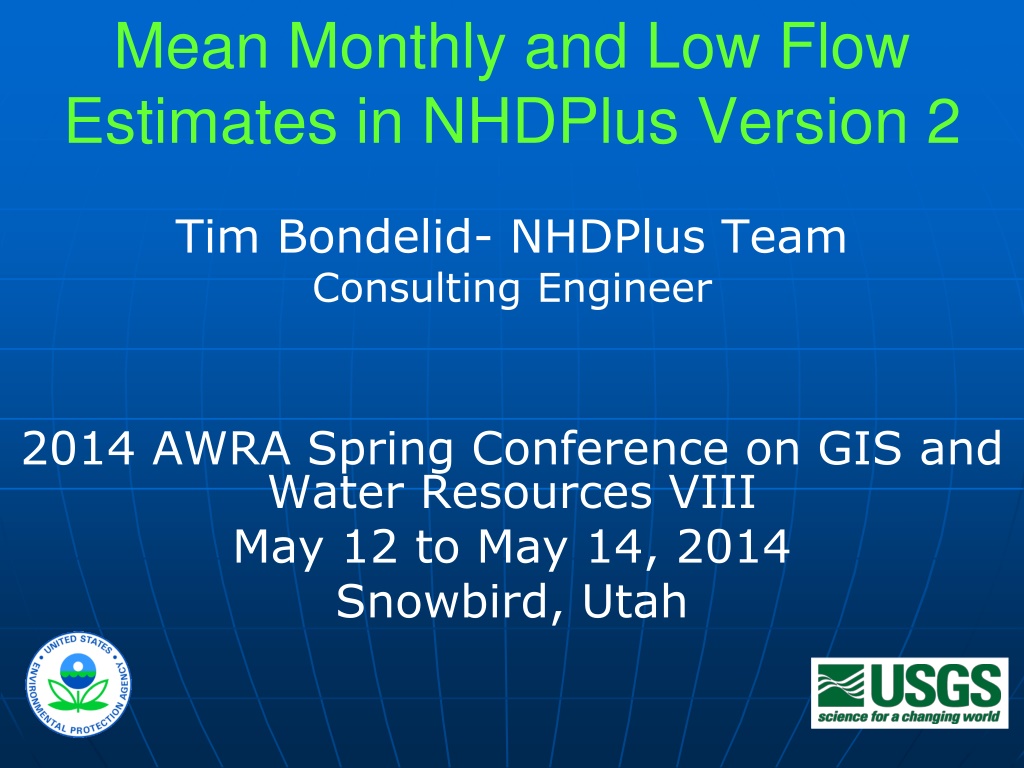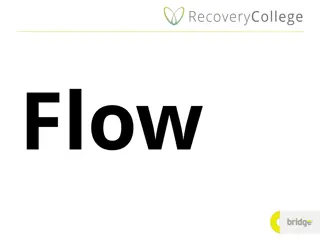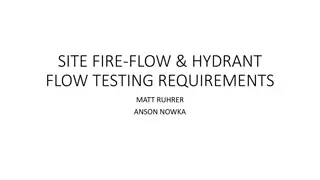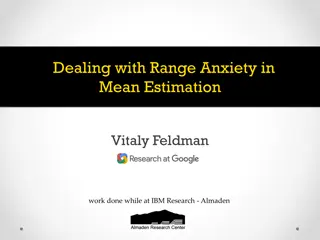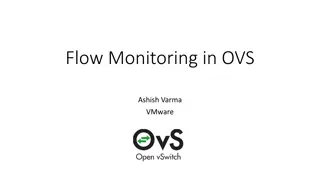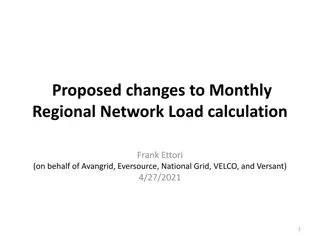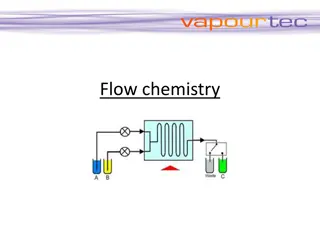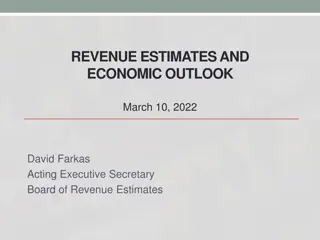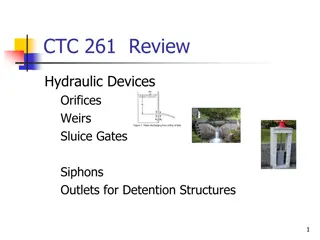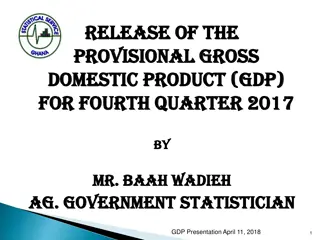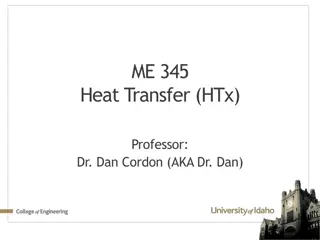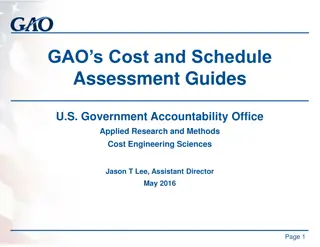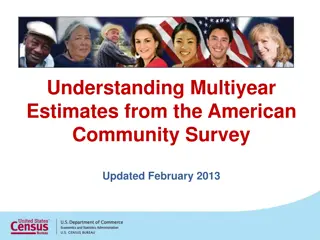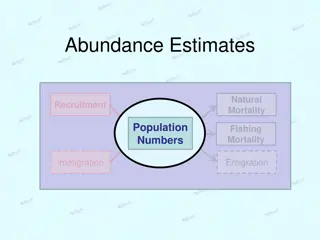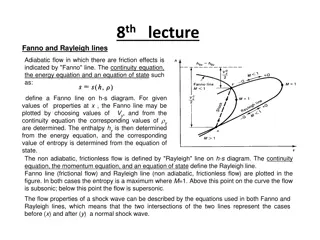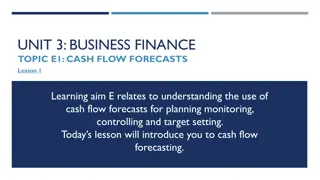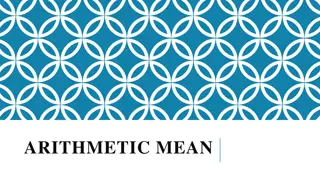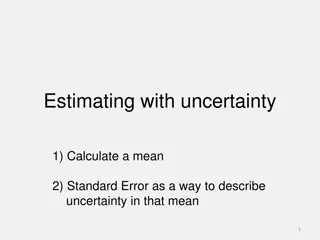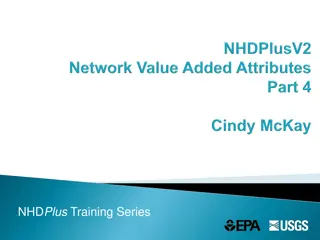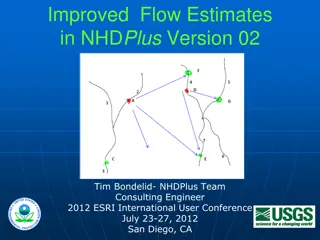NHDPlus V2 Mean Monthly and Low Flow Estimates
NHDPlus Version 2 includes mean annual flow and velocity estimates for all stream segments. The release now features mean monthly flow and velocity estimates as well as initial testing of 7Q10 flows. Learn about the methodology behind these estimates and the Enhanced Runoff Method (EROM) contributors. Discover the importance of stream flow estimates in supporting various water-related goals and initiatives such as EPA Strategic Plan, USGS Water-quality modeling, and National Stream Flow Information Program. Gain insights into the steps involved in NHDPlus V2 EROM flow estimation and Reference Gage Regression. Explore the collaborative efforts of key contributors like Dave Wolock, Kernell Ries, and Greg Schwarz in developing the EROM. Follow the presentation to understand the significance of accurate stream flow estimates in water management, emergency response, and watershed planning.
Download Presentation

Please find below an Image/Link to download the presentation.
The content on the website is provided AS IS for your information and personal use only. It may not be sold, licensed, or shared on other websites without obtaining consent from the author.If you encounter any issues during the download, it is possible that the publisher has removed the file from their server.
You are allowed to download the files provided on this website for personal or commercial use, subject to the condition that they are used lawfully. All files are the property of their respective owners.
The content on the website is provided AS IS for your information and personal use only. It may not be sold, licensed, or shared on other websites without obtaining consent from the author.
E N D
Presentation Transcript
Mean Monthly and Low Flow Estimates in NHDPlus Version 2 Tim Bondelid- NHDPlus Team Consulting Engineer 2014 AWRA Spring Conference on GIS and Water Resources VIII May 12 to May 14, 2014 Snowbird, Utah 1
This Presentation NHDPlus V1 and NHDPlus V2 include mean annual (MA) flow and velocity estimates All 2.7 M networked stream segments We have now released mean monthly (MM) flow and velocity estimates We have a first-round test of 7Q10 flows I will talk about how we did these MM and 7Q10 flow estimates 2
NHDPlus V02 Enhanced Runoff Method (EROM) Contributors: The NHDPlus Team EROM: Dave Wolock, USGS Kernell Ries, USGS Greg Schwarz, USGS 3
Importance of Stream Flow Estimates Support the water element goals expressed in the EPA Strategic Plan Support the water mission of the USGS Water-quality modeling (SPARROW) Regional and national stream flow assessments goal of National Stream Flow Information Program National Water Census Watershed planning and management Response to emergencies (ICWATER) 4
NHDPlus V02 EROM Flow Estimation Steps Runoff based on water balance model (RO) Excess ET component that takes into account excess evapo-transpiration in the stream channel area (EET) A regression of Step 2 flows on Gage flows using Reference gages (RGR) A capability for users to add, remove and transfer flows (PlusFlowAR) Adjustments to observed gage flows A flow QA module to evaluate accuracy of the flow estimates 1. 2. 3. 4. 5. 6.
U.S.: Wolock and McCabe; CN and MX: Canadian Forest Service 1971 - 2000 6
Step 3: Reference Gage Regression (SR) 100,000 10,000 EROM Flow (cfs) 1,000 100 10 1 1 10 100 1,000 10,000 100,000 Gage Flow (cfs) QA Statistics Gage Runoff EET Ref Reg. PlusFlow Gage Seq. Mean Mean SEE Mean SEE Mean SEE Mean SEE SEE 2.36 2.17 58.8 2.17 58.8 2.37 32.6 2.37 32.6 23.0 7
EROM MM Flows EROM built for MA and MM flows QA issues with MM flows: RO results in winter months in some areas produced very poor results Sometimes EET helped, sometimes it hurt RGR helped most of the time, but sometimes made the QA worse These QA issues led to the decision to not release MM flows 8
Poor RO Results Occurs in winter months in the Great Plains The runoff model is not able to model the VERY low baseflows in the persistently cold months. This issue occurs in 17 VPU/months. Approach: Replace the runoff grids with a regression equation. Need to model unit runoff (cfs/km2) EROM uses a flow accumulation approach
The Water Balance Model Temperature Potential Evapotranspiration Snow Snow Melt Rain Actual Direct Runoff Snow Storage Evapotranspiration Surplus Runoff Soil-Moisture Storage Capacity Soil-Moisture Storage (Slide courtesy of Dave Wolock, USGS)
Unit Runoff Regression Tested several statistical model forms Used Reference Gages What works well: Log-log regression using Precip, Temp, and Baseflow Index (BFI): URO (cfs/Km2) = 10a * Pcmc * TDegCd * BFIe * BCF a, c, d, e = regression coefficients BCF = Bias Correction Factor Required CA3T allocations for Temp and Precip for each of the 17 VPUs/months
Implementing Mean Monthly Flows Made a new production version of EROM (Version 10) Limits the RGR to the regression bounds Minimum of 10 years of gage record A new input file named EROMOPTS.DBF is used: One record for each VPU/Timeperiod 21 VPUs * 13 flows = 273 records Switches for running/not running EET and RGR and RO Regression coefficients
What Is Available EROMExtension: MA and MM flow and velocity estimates MA and MM QA files A QA spreadsheet; please use it VPUAttributeExtension: Catchment-level MA and MM Runoff, Temperature and Precipitation Cumulative MA Temperature and Precipitation 15
7Q10 Flow Estimates Estimate 7Q10 flows on ungaged flowlines (stream segments) in NHDPlusV2 Use networked flowlines Removes many canals and ditches Note: less than 1% of the flowlines have gages Leverage the advanced capabilities in NHDPlusV2 and the Enhanced Runoff Method (EROM) to test a cost- effective method for estimating interpretive flow statistics 16
Approach Calculate 7Q10 at gages Use the DFLOW program in BASINS USE NHDPlusV2 watershed characteristics: drainage area (DA), mean precipitation (MP) and temperature (MT), mean watershed elevation (MWE), watershed slope (WS), Base Flow Index (BFI) EROM MA and MM Flows Develop regionalized regression equations by Vector Processing Units (VPUs) 7Q10 = Fn(EROM Flow, DA, MP, MT, MWE, WS, BFI) Use a log-log regression 17
Approach (Cont.) Develop regionalized regression equations by Vector Processing Units (VPUs) 7Q10 = Fn(EROM Flow, DA, MP, MT, MWE, WS, BFI) Additional Steps Intermittent flowlines: 7Q10 = 0 Large River Adjustments 18
Challenges Low flows are affected by factors that can be difficult to quantify on a broad scale: Groundwater/baseflow Geology Physiography Reservoirs, other flow alterations The scope for this project is MUCH larger than other such studies 2.7 Million Stream Segments across CONUS The VPUs are MUCH larger than the 19
Regression Accuracy Measures Regression Measures: R2, Model Error Variance [log10] (MEV), Standard Error of the Regression (SER) in %. Q_E: EROM Flow Q_E * BFI works best overall VPU 02 Statistics: Vars n R2 MEV SER (%) 115% BCF Q_E*BF I, DA 563 0.92 0.16 1.4 20
Major Issues and Caveats DFLOW: 7Q10 flows are unsupervised Need to modify DFLOW for production Poor results in the Great Plains: Subdivide large VPUs Winter low flows? Poor Results in Southwest Very few perennial streams Some minor adjustments Streamline the process 24
A Low Flow Production System Period of Record,Flow Statistic(s) DFLOW NHDPlus, EROM, Other Data DBMS Regression Areas, Other Options Statistics Evaluation Regression Coefficient Db Low Flow Computations NHDPlus Low Flow Extension 25
Down the Road PlusFlowAR: Incorporate more detailed information from NHD Stewards, WBD, others! Seasonal values? EET Step: Model Coefficients, issues in some areas Continue 7Q10, other low flows Use a 1981-2010 time frame PRISM has released normals for this period An issue: international drainage 26
Read All About It! Go to NHDPlus.com This redirects you to the ftp.horizon- systems.com page Click on a hot-link in the text to get the User Guide In the User Guide: Pages 61-69: EROM and Attribute Extension Table Layouts Pages 125-147: How EROM works Note caveats for using velocities!!!! 27
Questions? Tim Bondelid - Independent Consultant to EPA timothy@trbondelid.com NHDPlus V02: http://www.horizon-systems.com/NHDPlus 28
